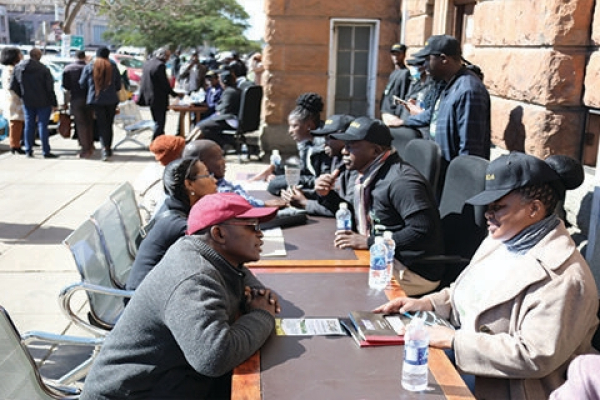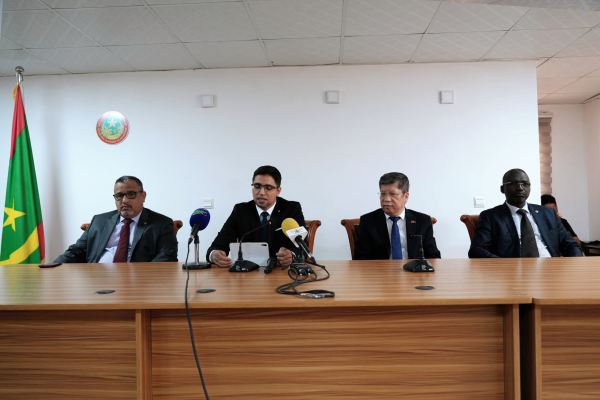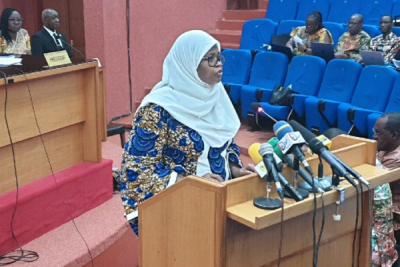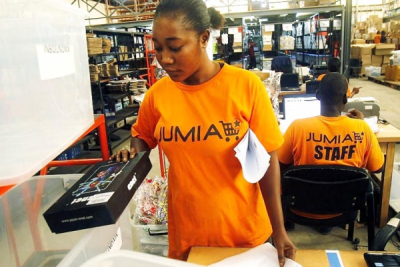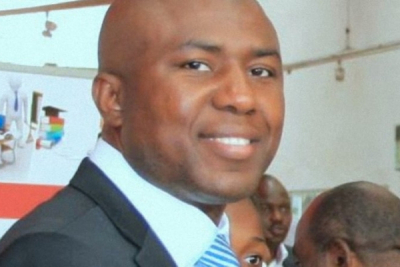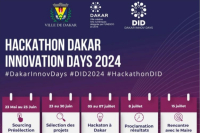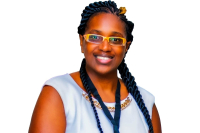Digitalization streamlines processes, reducing paperwork, time, and resources required for court proceedings. This efficiency can lead to faster resolution of cases, which is crucial for economic development as it enhances the ease of doing business and fosters investor confidence.
Zimbabwe’s Judicial Service Commission (JSC) has embarked on a campaign to digitalize magistrates courts nationwide, aiming to improve access to judicial information. The campaign was launched across all 10 provinces as the JSC marked its 14th anniversary on June 10.
Chief Magistrate Faith Mushure said, "Digitalization of the magistrates courts will begin on January 1, 2025. This is a critical step towards ensuring efficient, transparent, and accessible justice for all Zimbabweans."
Since its establishment in 2010, the JSC has aimed to provide easy access to courts and judicial services across Zimbabwe, particularly in marginalized areas.
In its DIGITAL ECONOMY FOR ZIMBABWE Country Diagnostic 2021 report, the World Bank reveals that Zimbabwe has the potential to establish a strong digital government, having laid the foundation for a digital ID system, core back-end systems, an accessible government portal, and innovative digital services. This development signals a shift towards modernization and efficiency within the country's governance structures.
Hikmatu Bilali
Africa's digital transformation is gaining momentum, and building a strong digital infrastructure is crucial to achieving the goals outlined in previous strategy documents.
Mauritania plans to install an additional 2,300 kilometers of optic fiber cable nationwide, Minister of Digital Transformation Mohamed Abdallahi Ould Louly announced on June 10th. The plan, unveiled at the launch of a fiber optic training program, aims to connect all wilayas and moughatas to fiber optic infrastructure.
This initiative is part of the Mauritanian government's Digital Agenda 2022-2025, which seeks to leverage digital technology as a catalyst for accelerating the country's socio-economic development. In May 2021, the government established a specialized ministry to oversee all projects related to this vision. Since then, the country has already implemented more than 5,500 kilometers of fiber optic cable as part of its efforts to improve digital infrastructure.
In addition to political will, this progress has been driven by various partnerships. Notable agreements include several partnerships with the United Arab Emirates and France, as well as prospects for enhanced cooperation in the digital sector with the United Nations. On April 2, the Mauritanian minister met with Leila Peters Yahya, the UN system's Resident Coordinator in Mauritania, in Nouakchott to discuss these collaborations.
Under its Digital Agenda 2022-2025, Mauritania planned to lay 4,000 kilometers of backbone infrastructure by 2025 and has outlined plans for an additional 4,000 kilometers in the coming years. The goal is to enhance Internet connectivity and access to international bandwidth, which are essential conditions for the development of e-government, the proliferation of startups, and the emergence of a technological ecosystem in the country.
Adoni Conrad Quenum
Digital transformation is a key focus of the development initiatives launched by the Burkinabé government. Ouagadougou aims to rely on World Bank assistance to successfully implement its digital strategy.
Burkina Faso is poised for a significant leap forward in its digital transformation journey. The Transitional Legislative Assembly (ALT) on Tuesday, June 11th, approved a $150 million loan from the World Bank's International Development Association (IDA) to fund the Digital Transformation Acceleration Project (PACTDIGITAL).
This ambitious project aims to bridge the digital divide in Burkina Faso by improving accessibility and adoption of digital services nationwide. The focus will be on reaching underserved areas, particularly rural communities, and marginalized groups.
"PACTDIGITAL will directly benefit a wide range of individuals," explained Minister of Digital Transition, Posts, and Electronic Communications, Aminata Zerbo/Sabane. "This includes women, youth, people with disabilities, internally displaced persons, and their host communities. Additionally, public employees - civil servants, teachers, and trainers - will gain valuable digital skills. The project also extends to private companies, formal and informal training institutions, local incubators, and associations. Notably, PACTDIGITAL covers the entire country, with security considerations factored in."
Building upon the successes of the West Africa Regional Communications Infrastructure Project (WARCIP - BF) and the e-Burkina project, PACTDIGITAL will serve as a springboard for further digital initiatives in Burkina Faso. The IDA funding is a critical step towards closing the country's significant digital divide. Official figures show a low mobile connectivity index of 26.2 in 2018. Additionally, 3G and 4G mobile network coverage rates remain low compared to neighboring countries, sitting at 64.3% and 41.5% respectively in 2022.
Samira Njoya
In 2021, Zambia recorded over 10 million cyberattacks, while losses for the financial sector were estimated at approximately $5.6 million between 2020 and the second quarter of 2022, according to the government.
In Zambia, a court has sentenced 22 Chinese nationals and a Cameroonian to prison terms ranging from seven to eleven years, along with fines for cybercrime, as reported by AP News on Saturday, June 8.
These convictions follow a series of investigations that began after a surge in computer fraud cases. Many victims reported unexplained losses of money from their mobile phones and bank accounts. The convicted individuals were part of an Internet fraud network, dismantled last April, which comprised 77 members, mostly Zambians. During the raid that led to their arrest, authorities seized over 13,000 SIM cards, firearms, and ammunition. The online scams orchestrated by this network primarily targeted Zambians, as well as individuals in Singapore, Peru, and the United Arab Emirates.
According to government data, Zambia recorded 10,718,002 cyberattacks in 2021. Also, the financial sector lost more than 150 million kwachas ($5.6 million) between 2020 and the second quarter of 2022.
In 2021, the country enacted the Cybersecurity and Cybercrimes Act, which aims to protect people online, especially children, and to facilitate the identification, reporting, and protection of critical information infrastructures.
Meanwile, the country ranked 10th in Africa and 73rd globally in the Global Cybersecurity Index (GCI) 2020 with a score of 68.88%.
Charlène N’dimon
Jumia, which achieved unicorn status in 2016, has established itself as a leader in the African ecommerce sector. The startup is setting its sights on further growth in Nigeria and Morocco.
Last week, e-commerce platform Jumia announced the opening of two new integrated warehouses in Lagos, Nigeria, and Casablanca, Morocco, aiming to bolster future growth and meet rising demand across the continent.
The Casablanca facility spans 5,000 square meters and will house over 300,000 products. Jumia, which became Africa's first unicorn startup (valued over $1 billion) in 2016, did not disclose details on the capacity of the larger 30,000-square-meter Lagos warehouse.
This expansion aligns with Jumia's strategy to solidify its position as Africa's e-commerce leader. Following its 2016 unicorn status, Jumia made strategic adjustments, including exiting the Jumia Food venture in 2023 due to operational and macroeconomic challenges across its seven markets.
The new warehouses are expected to significantly enhance operations in both Nigeria and Morocco, leading to improved efficiency, cost savings, and faster delivery times. Notably, Partech Africa data shows a 53.29% decline in African e-commerce startup funding in 2023 compared to 2022, reaching $298 million.
Adoni Conrad Quenum
A seasoned serial entrepreneur with extensive experience in technology, he leads an incubator that helps young Congolese become successful tech entrepreneurs.
Jean-François (Max) Bonbhel (photo) is a Congolese entrepreneur. As the founder and CEO of Yekolab, he provides startup incubation services and supports young Congolese tech entrepreneurs.
Founded in 2014, Yekolab is both a startup incubator and a center of excellence for training in new technologies and emerging professions. By leveraging the power of ICT, it promotes innovation, entrepreneurship, and job creation in Congo and across Africa.
In addition to incubation, Yekolab selects and mentors promising tech entrepreneurs, enhancing their technical and managerial skills. The incubator also offers acceleration services to local and regional SMEs, focusing on technology to help them increase their market share and become leaders in their respective fields.
Max Bonbhel is also the founder and president of Africa Java User Groups, a coordination network for Java programming language user groups in Africa. Furthermore, he founded and leads JCertif International, an organization established in 2009 that provides free training materials and speakers, and fosters collaboration among technology user groups on the African continent.
Since 2011, Max Bonbhel has worked as a freelance technical writer for Oracle. He is also a co-founder and the CTO of Access EMI, a U.S.-based company established in 2014 that connects tech businesses with tech communities.
An alumnus of Evry Paris-Saclay University, where he studied from 2000 to 2002, Bonbhel worked for several years at Fujitsu Canada. From 2004 to 2014, he served as a Java consultant, trainer, and project manager.
Melchior Koba
From July 5 to 7, the Dakar City Hall will host a hackathon for technology enthusiasts. Called Dakar Innovation Days, this event will showcase the creativity of students, professionals, and hobbyists. Organized by the Dakar City Council, the initiative aims to identify and promote innovative start-ups that contribute to local development.
Dahirou Thiam, the head of Senegal's regulatory agency for telecommunications and postal services (ARTP), recently welcomed a delegation from Guinea's counterpart, the ARPT. The Guinean delegation, led by Mamady Doumbouya, Director of Radiocommunications, visited from Wednesday, June 5th to Friday, June 7th. Their goal was to collaborate with Senegal's ARTP to develop a plan for rolling out 5G technology in Guinea.
She embodies excellence and innovation in the Kenyan digital sector. By supporting businesses and institutions in her country, she helps them succeed in their digital transformation and thrive in an increasingly technological world.
Brendah Mwirichia (photo) is a renowned Kenyan entrepreneur in the digital, technology, and marketing sectors. She is the founder and CEO of Peak and Dale Solutions, a creative and digital agency.
Founded in 2009, Peak and Dale Solutions stands out for its innovative digital solutions designed to help businesses start, operate, and grow. The agency offers a comprehensive range of services, including digital marketing, social media management, website design and development, content management systems (CMS), e-commerce solutions, and search engine optimization (SEO).
Over 15 years, Peak and Dale Solutions has collaborated with a diverse clientele, ranging from small and medium-sized enterprises (SMEs) to large corporations, as well as public bodies and non-governmental organizations. Through its user-centric and customized solutions, the agency has helped these entities thrive and become more competitive in their respective markets.
The company has also been repeatedly recognized for its excellence. At the Kenya eCommerce Awards, it was named eCommerce Agency of the Year in 2021, 2022, and 2023, and won the bronze medal for eCommerce SEO Agency of the Year in 2023. This year, Peak and Dale Solutions is nominated in three categories, reaffirming its leadership position in the sector.
Brendah Mwirichia has a strong academic background. She graduated from the University of Sunderland, England, in 2004 with a bachelor's degree in business computing. She also holds a bachelor's degree in mathematics, obtained in 2006 from the University of Nairobi. Between 2021 and 2022, she completed the Stanford Seed Transformation Program at Stanford University Graduate School of Business, enhancing her management and leadership skills.
Her professional career began in 2004 at Celtel Kenya (now Airtel Kenya) as an IT manager. In 2006, she joined Edgenet Ltd, a Kenyan technology company, as a lead software developer. From 2014 to 2018, she served as vice-chair of the Domain Registrars Association of Kenya, an independent non-profit organization promoting the Internet.
Melchior Koba
In Soussou, a widely spoken Guinean language, Arabinènè "New unpacking." The eponymous startup aims to revolutionize the Guinean e-commerce sector.
Arabinènè is an e-commerce platform developed by a Guinean startup. Organized as a marketplace, it allows users to purchase various items online from their computers or smartphones. Based in Conakry, the startup was founded in 2019 by Thierno Mamoudou Sow. Its goal is to encourage Guineans to buy and sell their products online and to promote local products to an international audience.
"Arabinènè aims to revolutionize the Guinean commercial sector and create hundreds of direct jobs and thousands indirectly across the national territory in various activities, from the marketplace to dropshipping and product delivery," the startup states.
Currently, Arabinènè offers a mobile app available exclusively on Android. Downloaded over a thousand times according to PlayStore data, the app allows users to create accounts and access the various online stores within the marketplace. Electronics, beauty products, home and office equipment – a diverse range of products awaits, categorized into dedicated tabs for easy navigation.
The platform curates its homepage to showcase relevant products. "Top Sales of the Day" highlights the most popular daily purchases, while other sections like "Latest Trends" and "Customer Favorites" guide user discovery. Arabinènè even provides a built-in delivery service within Conakry and surrounding regions, with delivery times varying from 2 to 72 hours based on distance.
However, Arabinènè is not yet available throughout the entire territory of Guinea. Expanding its reach nationwide is the next step to support its growth.
Adoni Conrad Quenum
More...
The Chadian government launched an ambitious Strategic Plan for Digital and Postal Development in 2020, demonstrating its commitment to bridging the country's technological gap.
Chad's Minister of Communications, Digital Economy, and Administration Digitalization, Boukar Michel, met with United Nations Economic Commission for Africa (UNECA) Executive Secretary Claver Gatete on the sidelines of the ICANN80 summit in Kigali, Rwanda, yesterday June 10th.
The discussion centered on fostering collaboration to address key challenges and unlock opportunities in Chad's digital sector. Minister Michel presented the country's Strategic Plan for Digital and Postal Development 2020-2030 (PSDNP) and the new president's digital policy platform. This presentation, according to a ministry statement, aimed to showcase Chad's digital ambitions and priorities, outlining both completed and planned initiatives.
Launched in 2020, the PSDNP serves as an ambitious roadmap for Chad's digital transformation. It outlines a series of reforms targeting key sectors like healthcare, education, and telecommunications. These reforms aim to expand access to digital services, bolster technological infrastructure, and cultivate innovation. The government estimates the total cost of implementing these projects at 1452 billion FCFA (US$2.4 billion).
Both parties concluded the meeting by reaffirming their dedication to strengthening cooperation and accelerating Chad's digital transformation journey. This collaboration positions Chad to leverage UNECA's expertise in developing robust digital infrastructure, enhancing digital skills, and more.
Samira Njoya
A computer scientist by training, she stands out for her expertise and innovation in the field of drones. She leverages her skills in this sector to address various needs in her country.
Marang Mbaakanyi (photo) is a Botswanan computer scientist and entrepreneur. She is also the founder and CEO of Drones for Africa, a company specializing in using drones to address various challenges across the African continent.
Founded in 2019, Drones for Africa positions itself as a one-stop shop for the sale of all types of drones. In 2023, the company began designing, building, and operating drones for various services, including medical supply delivery and data collection. They also provide last-mile agricultural services, train drone pilots, and offer repair and maintenance services.
The company also has a research and development center to contribute to the advancement of drone technology in Botswana. "We also have a Research and Development Centre where we keep looking for new approaches to investigate and develop the drone market. We want to be able to fabricate and put together drones locally," Marang Mbaakanyi stated in 2023.
Marang Mbaakanyi holds a bachelor's degree in computer systems engineering from the University of Sunderland, UK, obtained in 2014. She also earned a master's degree in computer science in 2021 from the Botswana International University of Science and Technology.
After her studies, Marang Mbaakanyi gained extensive experience working for several companies and institutions in Botswana. From 2015 to 2018, she served as IT manager at the Botswana Institute for Technology Research and Innovation (BITRI). Concurrently, from 2016 to 2023, she was a research assistant at the Botswana International University of Science and Technology. Between 2021 and 2023, she also served as deputy general manager of the Drone Technology Centre, dedicated to developing innovative solutions in the field.
Melchior Koba
In 2021, Beninese entrepreneur Raynald Ballo launched RMobility, a carpooling service modeled after the French company Blablacar. Recently, the company has expanded its offerings to include a ride-hailing service, providing cars with drivers (VTC).
On June 7, Beninese ride-sharing app RMobility launched a new ride-hailing service offering cars with drivers (VTC). This announcement was made during a press conference organized by the company.
"We believe that mobility should be accessible, safe, and convenient for everyone. By launching a VTC service, we aim to offer a more flexible and efficient solution […] as we have observed a growing demand for modern and reliable transport options," said Raynald Ballo, founder of RMobility.
The company has deployed a fleet of about fifty vehicles to compete in the increasingly competitive VTC market in Benin. To attract users, RMobility has enhanced its offerings by allowing customers to book bus tickets and event tickets through its app, in addition to carpooling and VTC services.
To promote these services, RMobility relies on its app and digital tools. According to the company's founder, these tools have already helped RMobility attract 20,000 users.
Servan Ahougnon
He aims to democratize access to financial services in Africa. To achieve that goal, he leverages technology to offer innovative solutions that simplify financial transactions for the population.
Barry Abdoulaye (photo) is a Guinean computer scientist and entrepreneur dedicated to the digital transformation of Africa. He is the founder and CEO of YMO, a startup building technological solutions to address financial inclusion challenges in Africa.
"In 2022, 1.3 billion Africans are still excluded from the traditional financial system. We believe that it is possible to have an account, receive money, and send money without handling cash. That is what we offer," Barry Abdoulaye stated in 2022.
Launched in 2019, YMO aims to revolutionize payments in Africa and for the African diaspora. The company develops accessible digital solutions that allow African citizens to perform instant financial transactions, both within the continent and internationally. For the diaspora, YMO provides simple and affordable ways to send money and invest in the continent.
YMO's ultimate ambition is to become the first pan-African neobank, open to everyone. To achieve this, the startup partners with credit institutions to facilitate access to credit via mobile phones. Based in France, YMO already boasts over 500,000 users across more than 30 countries in Europe and Africa.
Before embarking on the YMO venture, Barry Abdoulaye had already proven himself as an entrepreneur. In 2017, he founded Yitoo Technology, a firm specializing in software architecture and development, which he led until 2020.
A trained computer engineer with a master’s degree obtained in 2010, Barry Abdoulaye has also pursued advanced supplementary training. In 2018, he earned the Certified Scrum Product Owner (CSPO) certification, demonstrating his expertise in agile methodologies. In 2020, he undertook a course on blockchain technologies at the prestigious MIT Sloan School of Management.
His professional journey is equally rich, with experiences in renowned companies such as the communication agency Isobar, the media company TF1, telecom operator SFR Business, AXA Tech, and Prisma Media, where he held various developer positions.
Melchior Koba


